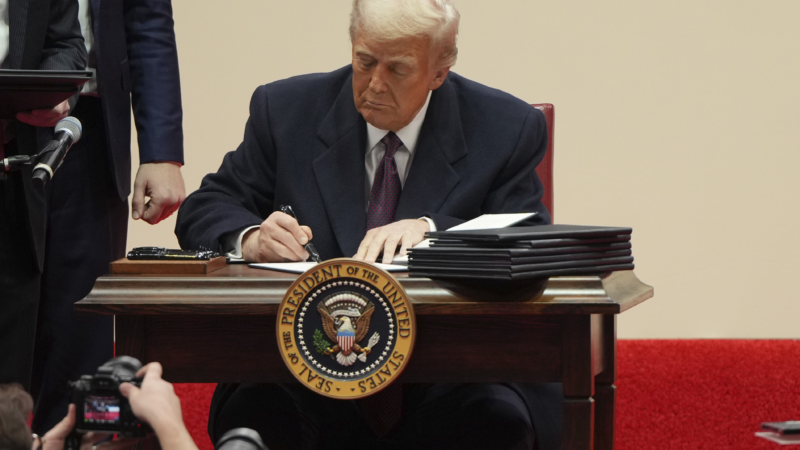Trump took down police misconduct database, but states can still share background check info
A federal system for doing background checks on law enforcement officers has gone offline — thanks to an executive order signed by President Trump when he returned to the White House on Jan. 20.
The National Law Enforcement Accountability Database (NLEAD) was launched in 2023 as a central repository of the professional records of federal law enforcement officers. The main purpose was to allow prospective employers — other federal agencies or local police — to check their backgrounds for misconduct. The system is now offline.
Why did President Trump decommission the database?
It appears to be a casualty of Trump’s flurry of first-day executive actions, which included the revocation of a long list of President Biden’s executive orders. One of those Biden orders was a package of police reforms signed on May 25, 2022, the second anniversary of the murder of George Floyd. The database was just one item among many in Biden’s order, and the Trump administration has not criticized it specifically, though in the preface to the revocation it criticized the Biden policies in general over what it called “unlawful and radical DEI ideology.”
Neither the White House nor the Justice Department has responded to NPR’s request for an explanation for the decommissioning of NLEAD.
Will this make it harder for law enforcement agencies to catch job applicants with problems in their past?
Yes, especially when officers move between federal agencies. The Biden administration had hoped this would also allow local police departments to check the records of former federal officers, and now that won’t happen. But when local departments hire officers with previous experience, they usually come from other state and local agencies, not from the federal government. And another system, called the National Decertification Index (NDI), allows departments to check officers’ records in other states.
Interest in the NDI has mushroomed in recent years, bolstered by concerns about “wandering cops” — officers who commit misconduct in one jurisdiction, then hide that history when they apply for new jobs elsewhere. Brian Grisham, who helps to run the NDI, says in the last five years the percentage of police departments using their background check system has risen from 23% to 71%.
“[It’s] the public and law enforcement demand for accountability,” Grisham says. “We’ve been around for 25 years and I’ve seen it grow from 30-something states to all states participating.”
Could the Trump Administration take down the NDI background check system, too?
Not likely. It’s run by IADLEST, a membership group for state police standards organizations, which isn’t controlled by the federal government. Grisham says it has received federal grants, as it’s expanded, but doesn’t depend on federal money to operate.
Is the White House reversing other aspects of Biden’s 2022 “police accountability” executive order?
The order was a grab-bag of measures that Biden signed, partly in frustration with Congress, which failed to pass the more sweeping “George Floyd Justice in Policing Act.” Since it was an executive order, its scope was limited to federal law enforcement agencies, and many of the provisions are about setting standards and writing policies. Many of those are in place by now, and they won’t necessarily be thrown out just because the executive order calling for them was revoked.
One example of this is the call for federal agencies to have policies for using body-worn cameras. Agencies contacted by NPR — the U.S. Marshals and Immigration and Customs Enforcement — say the camera policies remain in force, despite the Trump order revoking the original Biden order setting them up.
A battle of sounds stops at the inter-Korean border
The two Koreas have engaged in psychological warfare since the 1960s, with weapons like huge billboard screens, loudspeakers installed along the border, and airdropping propaganda leaflets.
Trump administration actions contradict MAHA rhetoric on toxic chemicals
Trump says he backs the MAHA agenda which includes eliminating toxins linked to human health problems. But his administration continues to cuts funds, grants and regulations that support that goal.
New Report: U.S. drug overdose deaths rise again after hopeful decline
The latest 12-month report from the CDC showed 1,400 more deaths in January of this year compared with the year prior. This comes after more than a year of dramatic progress. Experts say they're not sure if this is a "blip" or something more troubling.
Cloudy with a chance of showers? Fed’s economic forecast coming today
The Federal Reserve is expected to hold interest rates steady Wednesday. Members of the central bank's rate-setting committee will telegraph their plans for possible rate cuts later this year.
Conspiracy theorist Alex Jones accused of hiding money from Sandy Hook families
U.S. bankruptcy Trustee Christopher Murray has filed three suits accusing Infowars host Alex Jones of hiding millions of dollars in cash and property.
Announcing the 2024 NPR College Podcast Challenge Honorable Mentions
Here are some of the best entries in NPR's 2024 College Podcast Challenge.









